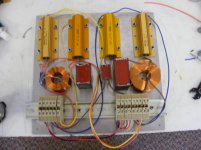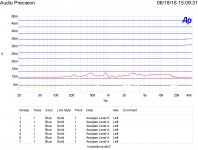To some here it is a religion.No. However, some of us tend to discount things that are based solely on sighted tests.
I regularly run BLT testing on my own.My own point of view is that DBT can make fine discriminations more difficult.
Except for very-well-trained and generally-dispassionate listeners, there is frequently a lot of performance anxiety.
DBT is hard work, and very boring except for the stress.
For example, I may have two files recorded to a Thumb drive.
I will listen to the two recordings until I have identified what I think are reliable differences, and then sight the display in order to know the label each of the recordings.
I then push track forward a random number of times and further do not look at the track display.
I then repeatedly listen and then track forward and repeat this cycle perhaps numerous times until I reckon that I know which track is which.
Once I have made this decision I then look at the display of the PB device I am using.
No other persons, familiar environment, familiar music, familiar system...no stress/performance anxiety.
By this method I find that I am able to very nearly perfectly reliably discriminate and identify the two recordings.
I am talking very fine differences here, and it can take multiple AB's to identify and memorise the differences, however once the two sounds are identified and memorised the test becomes child's play.
Do tell.I had to be tricked into such a test once, by someone who has a vested interest in belittling people---and I had not made any claims about my own faculties, other than that I suspected I had fairly normal hearing for my age at the time.
I passed the test, but I found it enervating and was irritated that I was tricked.
Again "there is frequently a lot of performance anxiety. "If however someone insists that he or she hears huge effects, yet cannot reliably identify these alleged effects when she or he is no longer certain as to what is being presented, then I become skeptical of the huge effects.
Anxiety is one factor, the magnitude of the effect is another.
I would say many 'audiophiles' lock onto the particular change, and to them indeed this change can be very significant/huge.
Under pressure or in an unfamiliar environment/system, the magnitude of the change gets lost in these 'confounding' test conditions, and unreliable testing is the result.
Remove the 'stress' factors and reliable results should be forthcoming.
Dan.
I regularly run BLT testing on my own.
I didn't know you were a food critic.
I didn't know you were a food critic.
This is nice joke, but
Do Higher Prices Make Food Taste Better? Science Says Yes
And what?
We have so called "audiophile" with $$$$ taste dependacy?
And what masurements can proove any difference?
But, there is difference in psychoacoustics, very variable for anyone.
For me, any diy gear is a lot of fun and more delight, then simple shopping.

very variable for anyone
The single mistaken assumption in your post
That's one of the reasons why when performing sensory evaluation of food and beverages, influences outside of organoleptic are controlled for.
I'm not, I enjoy pretty much any food....within limits of course.I didn't know you were a food critic.
In Aus there is no such thing as a BLT.....if it doesn't have meat and beetroot it's not Aussie.
Dan.
I had a GF who spent time in the US and introduced me to BLT's..my reaction, BFD.
BLT = Blind Looking Test
Baseline liposuction tarantula?
Pigs are friends, not food. 😀
In Aus that just goes without saying.Dan, you forgot to add the beer.
😉
Dan.
Good try Max. However, SY is part of the Lipshitz school of listening tests: Blind them until they cannot hear a difference. '-) It was established in the 70's and has developed quite a following since then. By 1980 Lipshitz et al had taken over the AES, and people like Otala and me gave up trying to put more audio research into the Journal. Some people like Tom Holman actually got out of consumer audio, because the differences that they previously heard could not be heard in a Lipshitz approved test, so they gave up to do other things in audio. This has carried on till today, where there are the 'listeners' and the 'ABX testers', and a constant war is waged. We can't actually shoot each other, so insults and confounding debate tactics are engaged. The battle has increased from back room insults of the 'other group' to public humiliation and even calls for Federal control of what people can buy or not. Is this really getting us anywhere?
The single mistaken assumption in your post
Why?
Another assumption is that we are all sensibile at $$$$ (a lot of $ fascination), in the same way or intensity.🙂
I think not.
There is some respect to expensive gears, but there is also common sense for butique equipments, snake oils and marketing claims...
Specially in some "purification", or "quantum" gadgets...
Good try Max. However, SY is part of the Lipshitz school of listening tests: Blind them until they cannot hear a difference. '-) It was established in the 70's and has developed quite a following since then. By 1980 Lipshitz et al had taken over the AES, and people like Otala and me gave up trying to put more audio research into the Journal. Some people like Tom Holman actually got out of consumer audio, because the differences that they previously heard could not be heard in a Lipshitz approved test, so they gave up to do other things in audio. This has carried on till today, where there are the 'listeners' and the 'ABX testers', and a constant war is waged. We can't actually shoot each other, so insults and confounding debate tactics are engaged. The battle has increased from back room insults of the 'other group' to public humiliation and even calls for Federal control of what people can buy or not. Is this really getting us anywhere?
Shorter John: I don't trust my ears and need to peek.
I didn't imagine you as a vegetarian somehow.
Only for the past 53 years or so, it's likely just a fad that I'll get over. 😀
In truth, I hardly do listening tests anymore, especially formal ones. How would I know (for sure) that I am hearing real differences? I just depend on my engineering and experience with what works, with a strong reliance on physical measurement. The only subjective listening that I work with usually is with my own hi fi system.
Generally, I use consensus of other peoples' listening opinions to know if I am still on the right track. Sometimes, the consensus goes opposite my measurements, and THEN I have to find out why, rather than disregarding their opinions. That is what keeps me successful, but I can't say that my ears are infallible.
Generally, I use consensus of other peoples' listening opinions to know if I am still on the right track. Sometimes, the consensus goes opposite my measurements, and THEN I have to find out why, rather than disregarding their opinions. That is what keeps me successful, but I can't say that my ears are infallible.
Here are the before and after impedance plots with the Zobel. Yellow is mid after and red is highs after no Zobel on the lows as it is almost close enough and the part's size is prohibitive.
Sorry forgot to match scales. Also looks like a small capacitor tweak is needed for the mids.
Sorry forgot to match scales. Also looks like a small capacitor tweak is needed for the mids.
Attachments
- Status
- Not open for further replies.
- Home
- Member Areas
- The Lounge
- John Curl's Blowtorch preamplifier part II


